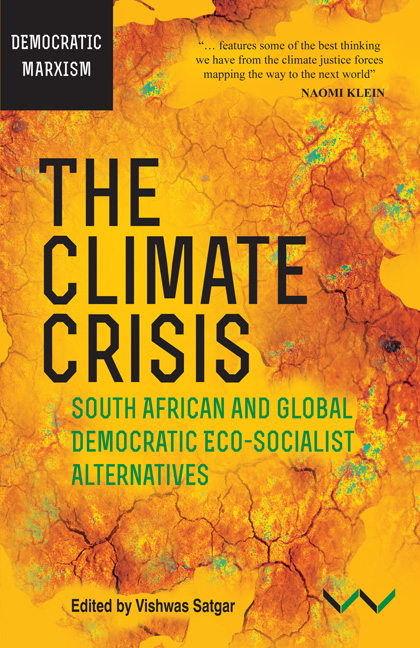Book contents
- Frontmatter
- Contents
- Tables and Box
- Acknowledgements
- Acronyms and Abbreviations
- Chapter 1 The Climate Crisis and Systemic Alternatives
- PART ONE THE CLIMATE CRISIS AS CAPITALIST CRISIS
- PART TWO DEMOCRATIC ECO-SOCIALIST ALTERNATIVES IN THE WORLD
- PART THREE DEMOCRATIC ECO-SOCIALIST ALTERNATIVES IN SOUTH AFRICA
- Chapter 10 The Climate Crisis and a ‘Just Transition’ in South Africa: An Eco-Feminist-Socialist Perspective
- Chapter 11 Energy, Labour and Democracy in South Africa
- Chapter 12 Capital, Climate and the Politics of Nuclear Procurement in South Africa
- Chapter 13 Climate Jobs at Two Minutes to Midnight
- Chapter 14 Deepening the Just Transition through Food Sovereignty and the Solidarity Economy
- Chapter 15 Eco-Capitalist Crises in the ‘Blue Economy’: Operation Phakisa's Small, Slow Failures
- CONCLUSION
- Contributors
- Index
Chapter 10 - The Climate Crisis and a ‘Just Transition’ in South Africa: An Eco-Feminist-Socialist Perspective
from PART THREE - DEMOCRATIC ECO-SOCIALIST ALTERNATIVES IN SOUTH AFRICA
Published online by Cambridge University Press: 05 June 2019
- Frontmatter
- Contents
- Tables and Box
- Acknowledgements
- Acronyms and Abbreviations
- Chapter 1 The Climate Crisis and Systemic Alternatives
- PART ONE THE CLIMATE CRISIS AS CAPITALIST CRISIS
- PART TWO DEMOCRATIC ECO-SOCIALIST ALTERNATIVES IN THE WORLD
- PART THREE DEMOCRATIC ECO-SOCIALIST ALTERNATIVES IN SOUTH AFRICA
- Chapter 10 The Climate Crisis and a ‘Just Transition’ in South Africa: An Eco-Feminist-Socialist Perspective
- Chapter 11 Energy, Labour and Democracy in South Africa
- Chapter 12 Capital, Climate and the Politics of Nuclear Procurement in South Africa
- Chapter 13 Climate Jobs at Two Minutes to Midnight
- Chapter 14 Deepening the Just Transition through Food Sovereignty and the Solidarity Economy
- Chapter 15 Eco-Capitalist Crises in the ‘Blue Economy’: Operation Phakisa's Small, Slow Failures
- CONCLUSION
- Contributors
- Index
Summary
The climate crisis presents us with a historic opportunity because to solve it we need radical transformative change in how we produce, consume and organise our lives. It is in this sense that a ‘just transition’ from the current fossil fuel regime in South Africa could both address the climate crisis and contain the embryo of a new, democratic, eco-feminist-socialist order.
This chapter suggests that reclaiming the hybridised and travelling discourses of feminism, environmentalism and socialism could give strength and coherence to a just transition to a post-carbon future. While there is no blueprint, all three discourses contain flashes of a vision of a post-capitalist society driven by a different energy regime and promote the solidarities necessary to drive transformative change. A major difficulty is that in contemporary South Africa all three discourses are, to some extent, contaminated. Feminism is widely viewed as elitist and individualist; environmentalism as focused on the conservation of threatened plants, animals and wilderness areas to the neglect of social needs; and socialism as productivist, authoritarian and repressive, as evidenced in the historical experience of the Soviet Union and – with more immediacy – the practices of the South African Communist Party (SACP). The chapter argues that the concept of social reproduction is especially relevant to this process of reclaiming.
THE MARXIST–FEMINIST APPROACH TO SOCIAL REPRODUCTION
Grounded in a Marxist–feminist analysis, this concept is important for six reasons. Firstly, it points to the possibility of unifying different struggles in the name of a reclaimed and reinvigorated feminism, environmentalism and socialism. It does so through building on the powerful Marxist capacity to explain different forms of domination through reinserting the special relevance of class into conceptions of intersectionality. It also does so through relating these struggles to material conditions of life. As Meg Luxton writes:
Politically, a social reproduction perspective validates a wide range of struggles that directly relate to standards of living. These include wages and working conditions, a living income for all, access to housing, healthy food, and communities and households free of violence. Issues such as climate change and other environmental concerns are clearly connected, inviting alliances.
- Type
- Chapter
- Information
- Climate Crisis, TheSouth African and Global Democratic Eco-Socialist Alternatives, pp. 210 - 230Publisher: Wits University PressPrint publication year: 2018



